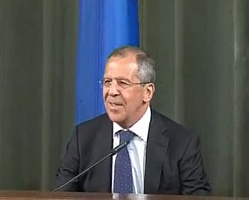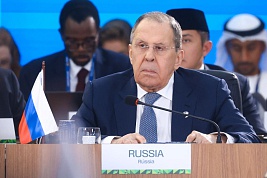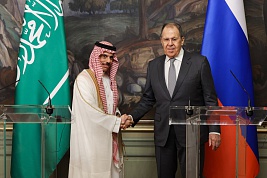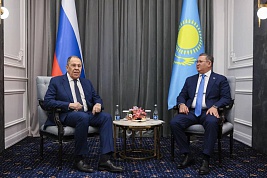Transcript of Remarks and Response to Media Questions by Russian Minister of Foreign Affairs Sergey Lavrov Following Informal Meeting of the Council of Foreign Ministers (CFM) of the Collective Security Treaty Organization (CSTO), Moscow, March 25, 2010
Dear Colleagues,
We have just completed an informal meeting of the Council of Foreign Ministers of the Collective Security Treaty Organization under the Russian chairmanship.
A wide range of issues on the international agenda was discussed. We exchanged views on ways to develop the CSTO in line with the basic guidelines that have been set in the decisions of the heads of state within the Collective Security Council.
Today's debate focused on our collaborative efforts in the international arena. We discussed in detail the problems that are being dealt with by our countries within the OSCE framework, considering that Kazakhstan presides over the body this year. In the context of the ongoing work in the OSCE, we agreed to continue to promote the initiatives concerning fundamental issues of OSCE activity, formulated and submitted by the CSTO countries to this Organization. Today we fully confirmed their relevance within the framework of the discussions now developing in the OSCE and dedicated to a comprehensive approach to European security.
We discussed relations between the CSTO and other international organizations, especially in light of the recently signed Joint Declaration on Cooperation between the UN and CSTO Secretariats. In addition, we examined issues concerning the CSTO-EurAsEC interaction. An exchange of views took place on how to raise the effectiveness of the Organization in solving problems connected with the situation in Afghanistan and with the threats emanating from that country.
Four statements were approved. First and foremost, the Statement on the sixty-fifth anniversary of the Victory in the Great Patriotic War; then the Statements on cooperation in furthering Russia's initiative to craft a European Security Treaty and on our countries' unified stand regarding the upcoming Review Conference of the States Parties to the Treaty on the Nonproliferation of Nuclear Weapons in May this year; and the Statement in support of Kazakhstan's actions as OSCE chair in promoting our interests in this Organization.
I think that all participants in the meeting are satisfied with its outcome. We have created additional "building blocks" in our foreign policy cooperation. I hope that this process will be useful for all of us and will make it possible to better protect the interests of the CSTO member states in the international arena.
Question: Will the START II Treaty be signed in Prague? If so, what symbolic significance could be discerned in this choice?
Lavrov: Prague is being discussed as a possible venue for the signing of the Treaty on Strategic Offensive Arms between the Russian Federation and the United States of America. To search for symbols is a thankless task. Convenience for the two presidents will be the overriding consideration. It is on this basis that they will soon make final decisions on the place and date of signing the new Treaty.
Question: There has been a piece of news on the ticker today that NATO almost categorically does not support Russia's call for the destruction of Afghan opium crops. How would you comment on that position of NATO?
Lavrov: I did not see that running line. I only know that the question of how to fight the Afghan drug menace more effectively and decisively is becoming increasingly urgent. It has been constantly present in our discussions with NATO. By the way, this issue is also present in those proposals that the CSTO a few years ago made to NATO, including the need to forge real-time interaction, in light of Operation Channel being conducted by the CSTO members on the outer perimeter of the Afghan border to interdict drug convoys. Considering that NATO is operating inside Afghanistan, as the backbone of the International Security Assistance Force, whose job is to combat the narco-threat, such an interaction would, of course, be mutually useful. So far we only managed to get Nikolai Bordyuzha invited to a Russia-NATO Council meeting where he noted the opportunities for our joint work, which have not yet been realized through any fault on our own part.
We are convinced that the anti-drug drive should be comprehensive, including the destruction of poppy fields, crop substitution, the crushing of heroin laboratories in Afghanistan and tough measures to prevent the deliveries of precursors to Afghanistan, because heroin cannot be produced without them. We're also talking about interdicting drug convoys, and cutting off the drug trafficking routes out of Afghanistan – into Central Asia, Russia, Europe, the United States of America and so on.
To remove some one link from this comprehensive package approach would be wrong. We know that when NATO began to fight the drug menace, it focused precisely on the destruction of poppy fields and crop substitution. Recently I have heard US officials express doubts about the relevance of these measures. For our part, we believe that not a single element can be removed from the comprehensive package approach to anti-drug efforts. I think that it is in this spirit that we will continue our work with NATO, particularly when we next consider in the UN Security Council how effectively the International Security Assistance Force is fulfilling its mandate, including the fight against the drug menace.



